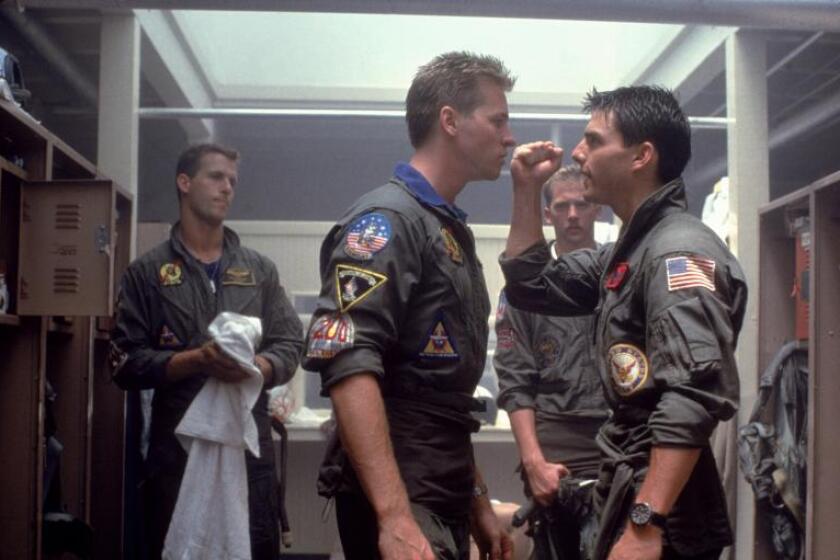Appreciation: Robin Williams seized the day in every role
- Share via
Shock came first on hearing the news Monday that the master comic mind we knew as Robin Williams was dead at 63, apparently overwhelmed by the kind of despair that he lightened for so many of the rest of us.
Next, as though he was orchestrating my memories, his Genie from “Aladdin,” puffed up in brilliant blue, came roaring in, vamping through “(You Ain’t Never Had A) Friend Like Me.”
In a profound sense, that song says it all — we ain’t never …
With a mind forever moving at warp speed, conjuring up humor unlike anything we had seen before and will likely ever see again, Williams was a friend, the kind who made our world better. At his height, he electrified whatever entertainment he touched.
Though TV brought his breakthrough — I still remember his remarkable alien invasion in “Mork & Mindy” — film quickly became the main forum for a talent that was as elastic as that face.
Eyes twinkling with mischief made it clear that whatever else was going on, he had your back. He could be anything you wanted, as his Genie explained to the street urchin in the 1992 Disney cartoon adventure.
He was our magic carpet in “Aladdin” — the animation allowing him the freedom to morph into any shape he could imagine — and countless other movies as well.
His first film credit came in 1977, a year before “Mork” shot him into the stratosphere of the famous and the famously funny. It was a forgettable comedy called “Can I Do It ‘Till I Need Glasses,” in which he’s listed as “Lawyer/Man with Tooth Ache.” In the Hollywood pecking order it followed “Random Old Lady” and “Man on Bus.”
Williams’ first big-screen mark came in 1980, in one of director Robert Altman’s lesser works, the live-action “Popeye,” with Williams transforming himself with a corncob pipe and outsize forearms. Altman allowed Williams to use every ounce of his considerable physical comedy — the Silly Putty mouth that could manage endless shapes, that thick-set body, perfect for muscling through anything for Olive Oyl and Swee’Pea.
But it was in flexing his cerebral side in 1982’s “The World According to Garp” that Williams found his footing in film. This was no comic role. The adaptation of John Irving’s seminal novel about a young Southern writer and wrestler navigating a world being redefined by feminists, starting with his mother, allowed Williams to stretch in different ways. He surprised us. He could do drama; he could do more than tap that distinctive funny bone.
In the years after, Williams continued to surprise, making a habit of leavening his comedies with drama. His Russian defector’s last stand at Bloomingdale’s, in Paul Mazursky’s “Moscow on the Hudson,” is among his most endearing. His homeless dreamer in “The Fisher King” among his sweetest, and saddest.
Williams’ wisecracking wake-up call for soldiers in “Good Morning, Vietnam” brought his first Oscar nomination in 1988. A decade and two more nominations later — for “The Fisher King” and “Dead Poets Society” — he won after two unknown writers, Ben Affleck and Matt Damon, gave Williams the role of a lifetime.
Introspective, quiet, patient, nuanced, his “Good Will Hunting” performance as a psychologist who saw something more in an M.I.T. janitor had human qualities that often seemed the antithesis of the larger-than-life persona Williams pulled out of his back pocket like a driver’s license, ready when needed.
One of the many times I saw Williams on “The Tonight Show,” after he’d gone on a manic riff that left a laughing Johnny Carson wiping away tears, I wondered if he could ever switch off that energy, that inventive mind. We would hear of his demons, his stints in rehab. There were hints of the pain that shaded some of his performances, but he mostly kept the darkness private.
When Williams was in front of the camera, he was on. Whether the work called for the contemplation of “Good Will” or the roaring fun of his gay cabaret owner in Mike Nichols’ “The Birdcage,” there was an electricity you could sense — and see — every time he was on screen.
Not all of Williams’ films were great ones. The recent years in particular have been filled with thorny projects — his talent more often tucked into some tight corner, a secondary player when center stage was his strong suit. Thankfully, there are so many roles that did give him breathing room, parts where he could be whatever he needed to be in that moment, characters that will ensure his spot among the comedy greats.
But who knows what might have come? An hour or so before hearing of Williams’ passing I saw the new trailer for “Night at the Museum: Secret of the Tomb.” It is one of this year’s coming Christmas films, and in it Williams reprises his role as Teddy Roosevelt. There are other finished films in the pipeline to remind us of what we’ve lost, although a planned sequel to his brilliant daddy-disguised-as-nanny “Mrs. Doubtfire” will no doubt be scrapped.
Of all the indelible work he did, if I had to choose a favorite it would be “Dead Poets Society,” playing an awe-inspiring English teacher exhorting his pupils to “seize the day!”
That is what Robin Williams made you want to do every time he took the stage. “Seize the day!” Because he did.
The sun is a little less bright, the night sky a bit less starry now that the white-hot comet of Robin Williams, who trailed so much pure joy in his wake, is gone.
Twitter: @BetsySharkey
More to Read
Only good movies
Get the Indie Focus newsletter, Mark Olsen's weekly guide to the world of cinema.
You may occasionally receive promotional content from the Los Angeles Times.








